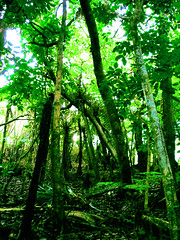 |
| Shakespear Point, New Zealand |
However, right now, I am here in Norwich - a wonderfully vibrant and creative city of diverse culture and a wealth of history. Positive visioning is a wonderful and essential method of transition to a highly sustainable lifestyle but in the meantime, I have spent most of my life living in cities (or bourgeois suburbia) and will most probably remain an urbanite for a good few years yet. I love cities for many reasons. The physical scale compared to a rural village or woodland outpost, the inevitable saturation within a constantly evolving history, the wide variety of people from various regions of our planet and different walks of life, all these things thrill my heart. The systems that seem to order our modern urban lives on the other hand, leave much to be desired and perhaps that’s why my rural dream is so powerful.
As demonstrated by the other writers on this blog and a host of forward thinking people elsewhere, sustainable, low carbon living in an urban setting is not only possible but is in many ways an easy choice. The overused Kermit line, ‘it’s not easy being green’, holds very little truth these days and is often a convenient excuse for maintaining the passive, all accepting, ‘economic growth at all costs’ status quo. Being green, living sustainably and consciously, evolving from passive consumerism to low carbon living is easy if we know how.
 |
| 'Human' graffiti, Pottergate, Norwich |
In that slowing down we may find it is no longer necessary to buy our food and groceries from supermarkets, particularly when (as in Norwich) there are so many local markets, on-line suppliers, independent stores and healthy, organic produce available. It may seem futile to buy new clothes from high-street stores because someone else tells us that our current wardrobe is now ‘out of date’ or no longer ‘on trend’. We may realize that updating our technological gadgets because we’re shown a glimpse of a newer, shinier model is not imperative to the good life. Suddenly the idea of growing our own food or buying from local, sustainable suppliers seems more inviting. Swapping, mending, recycling and making our own clothes and homeware becomes desirable.
In the slowing, we may find that we’d rather walk, take a bus or train or car-share instead of driving in our own personal metal bubbles. We may find that using less non-renewably sourced energy becomes an attractive option. Rather than locking ourselves away with all our worldly treasures held tight, we may want to share our time, skills, knowledge, resources and material possessions with our friends, family, neighbours and wider community who may in turn, start to appear more essential to living well than we had previously thought. We may find that the slowing improves our health and wellbeing and makes us feel more alive.
 |
| Labyrinth, Norwich Cathedral |
Rules can be made up as we go along or we can discard them altogether. We can learn not to accept other people’s rules if they don’t suit us. We can allow mistakes to be made, allow time to grieve, learn lessons, find a more appropriate path and continue the journey. We can go easy on ourselves and discover what works best for us, changing our plans as necessary. There is no one perfect path except the one you are on. Travel slow and travel well x







Actually living in the city gives you greater access to many 'green' things. You are in biking distance of a wide range of shops and employment. People living in the country may have larger gardens but they are generally more car and supermarket dependant.
ReplyDeleteOf course, in the 60's many Norfolk villages were dying as farm work dried up. Mass car ownership in the 70's enabled people to commute longer distances and people started buying derelict farm houses and moved out from the city. I've seen a 1963 film by John Betjeman where he appealed for people to come and 'save' Diss from decay. (http://ftvdb.bfi.org.uk/sift/title/794649).
The slowing down you talk about here Rachel is key to so many things. And like you, I think we do have an innate ability to access it.
ReplyDeleteAlthough it does take practice, holding your own in a sped-up, do-be-get-it-now world.
Great article
ReplyDeleteWatching the recent BBC Stargazing programmes really makes you realise that even if there are other life-supporting planets in the universe, we haven't found it yet and it's safe to say if we do it would take a little while to reach it.
Therefore we need to appreciate every bit of life that this planet Earth affords us and to protect it before it's too late.
Thanks for your comments guys!
ReplyDelete@John - you're right - easy access to 'green' resources in towns and cities. My rural vision involves a high degree of sustainability where a car and supermarket would be even less necessary than urban life. However, it is only a dream at this stage and thus probably contains a high degree of naivety that I'll discover when I get there :)
@ Mark - yes, practise, practise, practise. And that's what this life is for, right :)
@ Tom - thank you! Fascinating show, wasn't it. Even if we did know of other available and accessible planets, I think we have a responsibility to look after this one before we high-tail it out of here! You're right, there is so much to appreciate here on Earth. It is a wonderful life :)